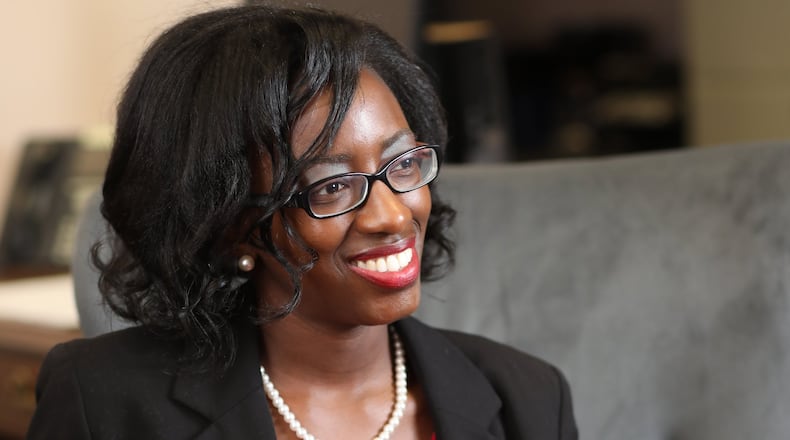Her plan was to wait until she turned 40 before entering the world of politics.
But at age 27, while pursuing her master’s degree in business administration and working as a lawyer, Dar’shun Kendrick saw an opening. The incumbent state representative in her district had opted not to seek reelection. Kendrick decided to go for it.
In November 2010, she was elected to the House District 94 seat, representing Lithonia, with more than 80 percent of the vote.
VIDEO: More on women in business
Atlanta needs more women — specifically businesswomen like Kendrick, who was running her own small firm — willing to go for it, says Leona Barr-Davenport, president of Atlanta Business League.
Across the nation and in Georgia, a record number of women are running for political office this November. And, while that's a good thing, Barr-Davenport would like to see even more of her ilk getting in on the action, because she says many businesswomen are uniquely qualified for politics.
They bring managerial skills and fiscal knowledge, and many have already had to face and overcome gender biases in male-dominated fields, she told the group attending the Atlanta Business League’s annual conference earlier this month. Their voices, she said, could add diversity in policy making.
Politics, largely, is still a man's domain. Less than 20 percent of officeholders in Congress are women. Georgia's state legislature is similar. According to the Center for American Women and Politics, women make up about 27 percent of Georgia's General Assembly. Sixty-three of the 236 legislators serving at the body are women. In this election cycle, 121 female candidates qualified to run for the state legislature compared to 75 in 2016. Currently, the state has only one woman out of 15 men holding a statewide executive office.
“We have to be engaged in the process. We have to talk about what is important for us because, if we don’t, then what you will have is others will push their agendas, and their agendas will have no value for me or you,” said Barr-Davenport.
According to the Pew Research Center, a majority of the Americans surveyed this summer indicated they would like to see more women in top leadership positions in both politics and the corporate world. But most of the respondents said such pursuits are easier for men because they face fewer barriers while women often have to do more to prove they belong.
Kendrick tends to agree. But sometimes, she said, women hold themselves back because of doubt.
“Men can get up and tie a shoe and think they can run for office. Women can have the degrees, backgrounds, the awards and they still think they are not there. A lot of that is social conditioning,” she said.
Jennifer Lawless, professor of politics at the University of Virginia, said female politicians with a business background bring transferable managerial, communication and fiscal skills. They also come with an understanding of policies relevant to the business environment.
Most of the women surveyed by Pew think their gender brings a different outlook and leadership style. In the survey, 71 percent of women say that women in political leadership are more compassionate and empathetic than men, while 50 percent of men agree. At the same time, half of the public — 52 percent — says showing emotions hurts women in politics, while 39 percent say the same about men.
About 40 percent of people see men as more willing to take risks in both business and politics, the survey indicated.
Kendrick has no doubt that the perspective she’s gained from running her firm has helped her better maneuver the political world.
Her ability to multitask and negotiate have been crucial in her career, she said. “[My business background] has come in so handy because, in politics, it’s give-and-take, and you are always negotiating with somebody whether it’s a constituent or somebody on the other side of the aisle.”
And while fund-raising challenges are a major reason why many women shy away from political office, businesswomen can often tap into their contacts to engage donors.
Efforts by national organizations to financially back viable female candidates running for key statewide offices have also made it easier for them to overcome the fund-raising challenge.
“If women begin to see other women effectively fund-raise, and if businesswomen see other women are supporting their candidacies, that will serve as more impetus for women to seek office,” said Loretta Lepore, the principal of Lepore Associates, an Atlanta-based strategic communications and government relations firm.
Apart from running for office, Lepore said, businesswomen can engage in politics in different ways, such as offering financial support to qualified female candidates.
“There are a lot of ways that businesswomen can get their toe in the water without jumping in the pool,” she said.
More details
The Pew Research Center conducted a survey this summer to gauge the public’s attitudes on women in corporate and political leadership positions. The findings, released last month, showed Americans attribute the paucity of women in politics to several reasons. Among them:
- Women have to do more to prove themselves than men: 61 percent agree
- Women get less support from party leaders: 52 percent agree
- Women face gender discrimination: 49 percent agree
- Americans are not ready to elect women leaders: 45 percent agree
- Women aren't encouraged to be leaders from an early age: 42 percent agree
- Women are held to higher standards than men: 37 percent agree
- Not as many women are interested in these positions: 27 percent agree
About the Author
Keep Reading
The Latest
Featured



